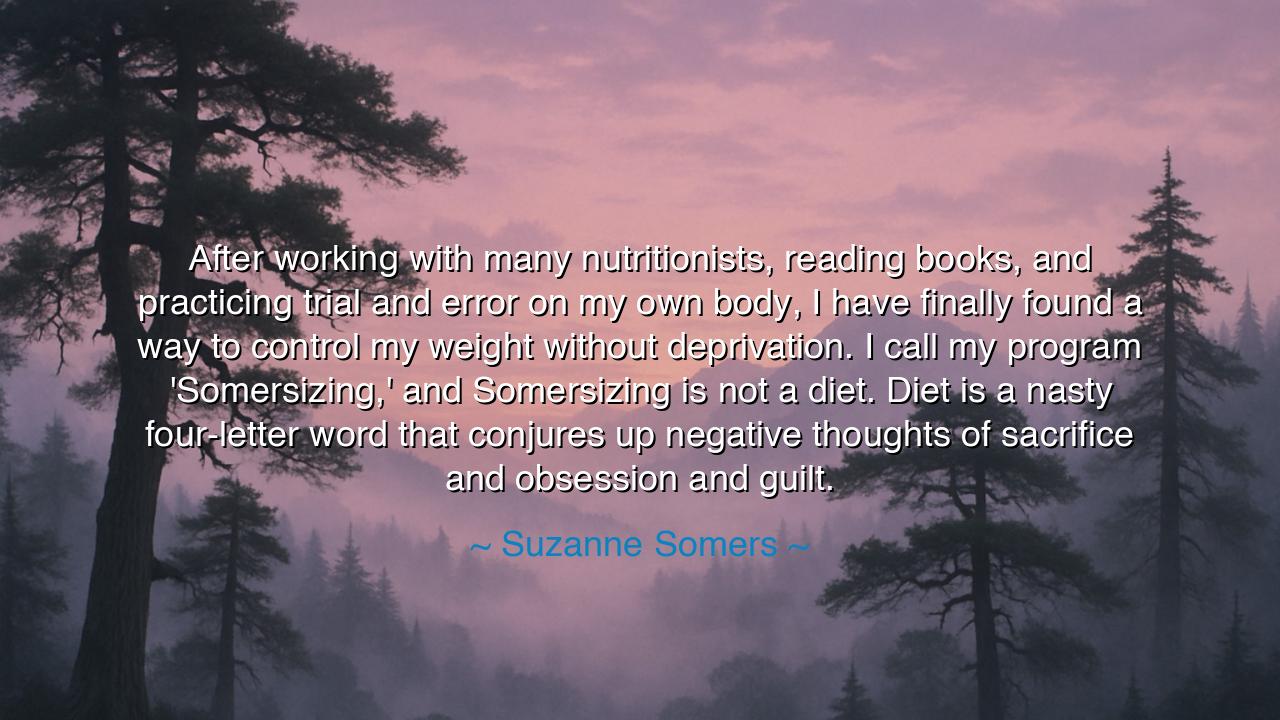
After working with many nutritionists, reading books, and
After working with many nutritionists, reading books, and practicing trial and error on my own body, I have finally found a way to control my weight without deprivation. I call my program 'Somersizing,' and Somersizing is not a diet. Diet is a nasty four-letter word that conjures up negative thoughts of sacrifice and obsession and guilt.






In the vast and ever-changing landscape of human existence, there is a profound truth that governs the ways in which we care for our bodies. It is a truth that transcends mere numbers on a scale, a truth that speaks to the very essence of what it means to live in harmony with oneself. Suzanne Somers, in her wisdom, offers us a powerful insight into this truth when she says, "After working with many nutritionists, reading books, and practicing trial and error on my own body, I have finally found a way to control my weight without deprivation. I call my program 'Somersizing,' and Somersizing is not a diet. Diet is a nasty four-letter word that conjures up negative thoughts of sacrifice and obsession and guilt." Here, Somers speaks not only of weight loss, but of the deep struggle that many face in the quest for health—an inner battle between self-discipline and freedom, between the desire for a better body and the fear of restriction.
The dieting world, often full of fad solutions and temporary fixes, can feel like a battlefield. It is a realm where deprivation reigns, where each meal is weighed not in nourishment, but in guilt. Somers, with clarity and wisdom, understands that true transformation cannot come through the chains of sacrifice. No, transformation comes through the embrace of balance—the balance between indulgence and restraint, between self-care and self-control. In the ancient teachings of Hippocrates, the father of modern medicine, we find a similar sentiment: "Let food be thy medicine and medicine be thy food." But what Hippocrates also understood was that this medicine is not about restriction, but about understanding the body and its needs, nourishing it, and living in harmony with it.
Consider the great philosopher Aristotle, whose thoughts on virtue were rooted in the idea of balance. He taught that to live a virtuous life was not to exist in extremes but to find the golden mean—the middle way between excess and deficiency. In this, we see a parallel to Somers' approach to health and weight management. Somersizing is not about the extremes of deprivation and obsession that often accompany traditional diets. It is about understanding the body’s natural rhythms, listening to its needs, and finding a way to nourish it without the guilt or shame that often follows restrictive eating. This, truly, is the way of the wise: to seek health not through punishment, but through thoughtful, balanced living.
The ancient world was full of people who understood that sacrifice and self-denial were not the keys to living a life of balance. Plato, for example, often spoke of the need to understand one’s desires and to control them, not by force, but through wisdom and understanding. This is the approach that Somers embodies in her program. Through her journey of trial and error, she discovered that true health does not come from the imposition of external rules but from listening to the body and honoring its wisdom. By reframing the very concept of dieting, Somers opens the door to a more holistic understanding of well-being—a path that is grounded in nourishment, joy, and fulfillment.
Consider the example of Leonardo da Vinci, whose body of work spanned art, science, and medicine. His remarkable genius was not born of deprivation or obsessive restriction, but from a deep understanding of the balance between the body, mind, and soul. He nurtured himself, not in the extreme of indulgence, but through measured attention to his needs, fueling his body with the energy it required to create his masterpieces. In this same way, Somers advocates for an approach that listens to the body’s signals, responds with respect, and moves away from the rigid constraints that often accompany the conventional ideas of dieting.
And so, we arrive at a profound lesson—a lesson that speaks not only to the body but to the very nature of the human condition. Somersizing is not merely a method of controlling weight, but a call to embrace balance in all aspects of life. True health is found not in the extremes, but in the gentle art of understanding one’s own body and respecting its needs. To live in balance is to understand that deprivation and guilt have no place in our pursuit of well-being. Instead, we must nourish ourselves with wisdom, with love, and with moderation. As we walk this path, let us remember that the true victory lies not in the weight we lose, but in the life we gain—one that is filled with vitality, joy, and a deep sense of peace.
In your own life, let Somers' wisdom guide you. Release the chains of guilt that so often accompany the pursuit of health. Honor your body with love and understanding, not with harsh restrictions. Find your balance, and know that it is in this balance that you will discover the path to a healthy, fulfilled life—one where nourishment is a celebration, not a burden, and where self-care becomes a joy, not a sacrifice. Somersizing, in its essence, teaches us that health is not a destination, but a lifelong journey of understanding, acceptance, and balance. Walk this path with wisdom, and the rewards will be bountiful.






AAdministratorAdministrator
Welcome, honored guests. Please leave a comment, we will respond soon